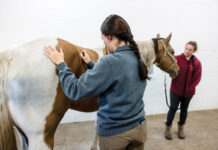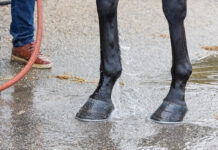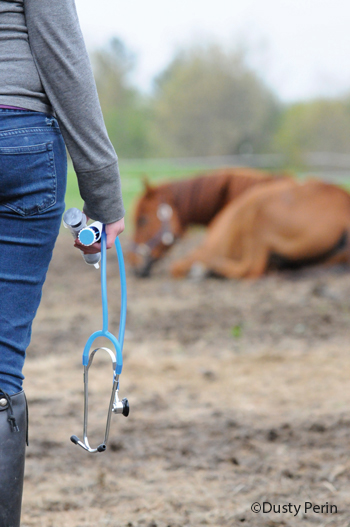
Few problems can leave you feeling more scared and helpless than a colicky horse. Sometimes colic feels as unpredictable as lightening striking, and it’s frightening to wonder when and if it may happen to your horse. But what is colic in horses? And what can we do about it?
What is Colic in Horses?
Parasites can cause colic, and so can overfeeding or the wrong kind of feed. Cancer is also a possible cause of colic. Because there are so many reasons for a horse to have a bellyache, there really isn’t a one-size-fits-all treatment, so it’s important to have a proper diagnosis of what is causing the pain before giving any sort of medicine.
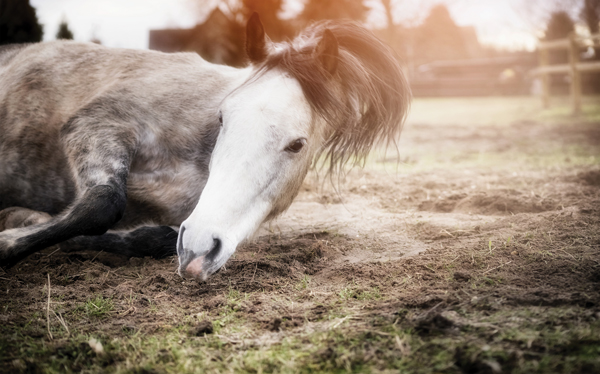
What’s Wrong
Horses show pain in many different ways, and usually the first thing that an owner will notice is that their horse just isn’t “acting right.” He may be standing off by himself, refusing food, or standing over the water trough but not drinking.
 Some horses will repeatedly stretch out as though they have to urinate. They may hold their tail cocked, look at their flanks, or curl their upper lip in the air. Pawing, lying down and rolling frequently are also signs of pain. Because the pain signs can vary so much, it’s important to know your horse’s normal behavior so that you can quickly recognize when something is off.
Some horses will repeatedly stretch out as though they have to urinate. They may hold their tail cocked, look at their flanks, or curl their upper lip in the air. Pawing, lying down and rolling frequently are also signs of pain. Because the pain signs can vary so much, it’s important to know your horse’s normal behavior so that you can quickly recognize when something is off.
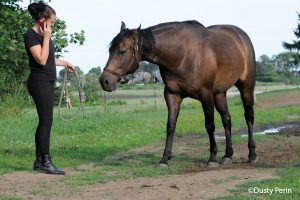
What to Do with Colic
The first thing to do is to get his vital signs. Take his temperature, pulse and respiration rate. Every horse owner should have a stethoscope. Practice taking vitals on your healthy horse and learn the normal ranges. Also listen to his belly and try to learn what healthy intestines sound like.
If your horse has been acting strangely for more than 15 minutes or the pain signs are worsening, it’s time to call the vet. She will ask you how long your horse has been feeling ill, questions about his diet and normal routine, his age and medical history, and his vital signs. If you can, have this information ready.
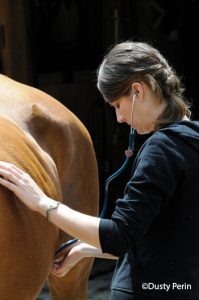
Don’t give your horse any medications without talking to the vet first. Someone at the barn may have a favorite colic remedy, but any drugs that you give the horse can interfere with the vet’s exam, and in some cases, they can make the horse worse if he is already dehydrated or has stomach ulcers. Again, until you know why the horse is sick, any treatment plan is only a guess and it may be the wrong guess.
It’s fine to take your horse for a short walk, but many horses that are in pain just want to lie down. It’s a myth that colicky horses must be kept walking or they’ll “twist a gut.” This is simply not true. Lying down and gently rocking can actually help work trapped gas through a crampy intestine.
If the horse is rolling, he’s telling you that his pain is getting worse. Don’t force him to his feet or force him to walk if he’s repeatedly going down. Just wait for the vet.
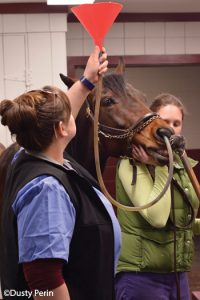
Treatment
The vet will probably sedate your horse and do a rectal exam to try to feel what the problem is. She may do an ultrasound of the belly if she needs more information. The vet will pass a stomach tube, and may give the horse medicine through the stomach tube.
She will probably give him some injectable medicine, draw some blood and take a manure sample for testing. Some horses have to be transported to a hospital for further care, and a low percentage may need surgery.
Prevention
An annual dental exam and float, a good deworming and vaccination program, and a diet appropriate for your horse may all help prevent colic. Regular turnout, socialization and grazing or frequent feedings help keep the gut healthy and minimize stress. Horses are designed to move and graze constantly, and the more their environment allows them to “just be horses,” the healthier and happier they will be.
This article about what is colic in horses originally appeared in the July/August 2019 issue of Young Rider magazine. Click here to subscribe!


